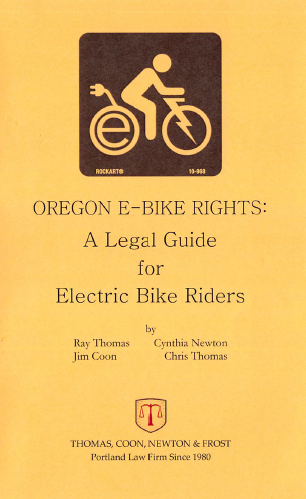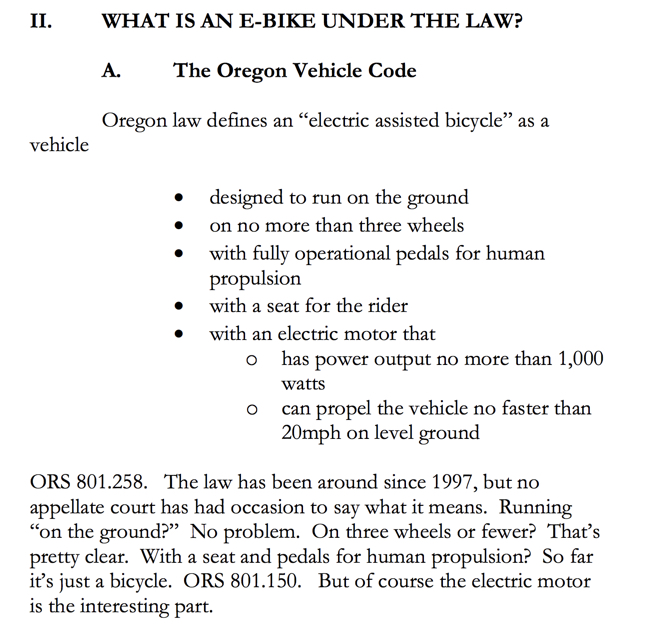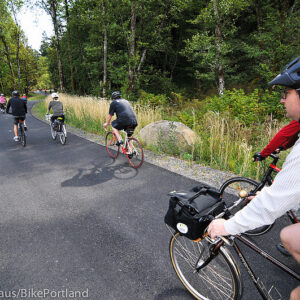
Electric scooters are hogging headlines right now; but e-bikes are Portland’s quiet transportation revolution. In the past few years the number of people riding with pedal-assisted motors has skyrocketed and local shops have seen a big increase in sales.
While e-bikes have carved out a safe space in Portland’s street culture, they — like their unmotorized brethren — still exist in somewhat of a legal Twilight Zone. Are they bicycles or “motorized vehicles”? Can they be ridden on sidewalks? Those are just some of the questions people often have about them.
A new legal guidebook by the law firm of Thomas, Coon, Newton & Frost aims to answer those questions.
Oregon E-Bike Rights: A Legal Guide for Electric Bike Riders was written by Ray Thomas, Cynthia Newton, Jim Coon, and Chris Thomas. You might recognize that first name as the lawyer behind Pedal Power: A Legal Guide for Oregon Bicyclists, which is now in its 10th printing and is widely considered Oregon’s bike law bible. Thomas and Newton are also BikePortland contributors (and the firm is a major supporter of bike advocacy in Portland, including a sponsor of our work).
TCNF’s 49-page guide is a comprehensive look at laws that govern the use of electric bikes in Oregon. In addition to a rundown of the relevant Oregon Revised Statutes, the guide also covers insurance policy questions, advocacy efforts to change existing e-bike laws and create better ones, and offers a resource guide if you want to probe further.
Advertisement

Here’s more from the author’s blurb:
Sometimes treated by law as a bicycle, sometimes as a motor vehicle, the bicycle with a battery powered electric motor has created a legal hybrid that defies easy and logical categorization. The Oregon Vehicle Code defines a low-powered “electric assisted bicycle” to be a bicycle, not a motor vehicle, but then also prohibits it from being lawfully ridden on sidewalks statewide. Oregon State Parks rules define the electric powered bicycle as a motor vehicle and restrict its operation to motor vehicle routes.
E-bike law in Oregon and elsewhere is very much a moving target… It is time for the laws to create a more hospitable legal environment for electric bicycle operators and coordinate the use of legal terminology and rules at the local, state and federal level to reduce presently existing confusion about where e-bikes can and cannot legally go.
The guide is available as a free PDF download and you can grab a hard copy from the TCN&F office at 820 SW 2ND Ave, Suite 200.
— Jonathan Maus: (503) 706-8804, @jonathan_maus on Twitter and jonathan@bikeportland.org
Never miss a story. Sign-up for the daily BP Headlines email.
BikePortland needs your support.







Thanks for reading.
BikePortland has served this community with independent community journalism since 2005. We rely on subscriptions from readers like you to survive. Your financial support is vital in keeping this valuable resource alive and well.
Please subscribe today to strengthen and expand our work.
can electric scooters and/or bikes be legally ridden on the esplanade or in a park?
Electric scooters and electric bikes cannot be ridden on the Esplanade as I understand it’s considered a sidewalk. A regular bicycle can and so can segways which is interesting since they have the same max allowed speed as the scooter.
https://www.oregon.gov/ODOT/Forms/DMV/6619.pdf
Oh ya MUP that’s what I was forgetting. That little graphic doesn’t address those but I assume it would be fine then certainly the springwater is. I don’t think an electric bicycle stops being one till you remove the motor which is what makes it an electric bicycle under the law.
By that same logic you should be able to drive a car on the sidewalk as long as you’ve got enough of a downhill and the car’s engine isn’t running. Because after all a car that isn’t running is just a cart with wheels right? Wrong.
My point is keep your moped “ebike” off my bike path.
Lol. No. That’s the great thing about eBikes. You can use the road, bike lanes and bike paths. If i just wanted to travel in the street I’d ride a Vespa.
If only a team of highly-trained and specialized lawyers could answer that question for us in a free publication! (sorry for the sarcasm)
On page 16: “”Shared-use paths” are not defined in the Oregon Vehicle Code. There is therefore no state law against riding an e-bike on a shared-use path, and the classification of “electric assisted bikes” as bicycles rather than motor vehicles provides an argument for e-bike use on shared-use paths, as long as those paths are not within the definition of “sidewalk.”6 Thus, for now, by omission, e-bikes are probably allowed on shared-use paths that are not part of the road right-of-way. “”
All of the e-bikes I have ridden have a motor cut-out at around 20 mph. However, the law appears to only require that the motor not be able to propel the bike faster than 20 mph by itself on flat ground. That should mean that the motor should stay engaged even if the rider adds enough power to take the speed over 20 mph.
Before anyone decries speeds over 20 mph as unsafe, let me say that I regularly ride my standard bicycle well over 20 mph. I also slow to whatever speed is called for in the interests of safety. (Show me a child on a bike path and I’ll show you just how slowly a bike can be ridden, including just stepping off. Anyone who scares a child needs a time out, imo.) However, there are roads on which speed greatly enhances my safety, so it seems wrong to have the motor cut out below that speed. We don’t do that to cars; we expect, perhaps over-optimistically these days, that drivers will exercise reasonable judgment.
on all the class 2 bikes i’ve ridden the motor cuts out entirely when the speed exceeds 20 mph. when i buy an e-bike it will almost certainly be a class 3 e-bike that i hack to remove any speed limitation.
You just provided the perfect explanation why no motorized vehicle should ever be allowed on a sidewalk.
huh?
riding in the roadway is an argument for riding on a sidewalk?
“so it seems wrong to have the motor cut out below that speed. We don’t do that to cars”
I’m told by owners of Toyota trucks who drive over 100 regularly (think Montana) that there is a speed limit (governor) somewhere north of 100, around 105-120.
womp womp.
Medical emergencies?
I’m guessing driving 100mph is the cause of more medical emergencies than it is the solution to medical emergencies.
I hear ya. I’m not against the idea of a governing device of some sort. I was just thinking about times I am camping pretty deep in the woods with my son. If there was no service and I needed to get him to a hospital, I would want every tool at my disposal (including speeding).
In Oregon, even ambulances have limits:
“Must not exceed any designated speed limit to an extent which endangers persons or property.”
I think driving over 100mph on any road with other users fits this description, and I’m assuming you don’t drive an ambulance with warning lights & sirens 🙂
Nah. I’m nowhere near that cool.
Who ya gonna call??
Why do you mock people concerned with civil liberties? Would you, in this era of Trump, prefer the government have more power over what you can say and do?
Would you say that a 100mph speed limiter is infringing on someone’s civil liberties?
That’s not what you were mocking:
>>> I’m sure people will point out the the “gubment” would then track our every movement. <<<
Government mass surveillance is a very legitimate issue in our age.
A 100MPH governor is really neither here nor there in our context; the difference between someone driving 90MPH and 101 MPH down SE Clinton is purely academic.
(sorry, not what John was mocking)
I don’t buy the “you can already be tracked so more tracking doesn’t matter” argument. We should not be doing anything that makes mass surveillance easier. It’s coming, it may already be here, but that doesn’t mean we should surrender any more privacy than we need to.
You could make a much more convincing argument by pointing out that, using existing technology, cars could be limited to the speed limit without granting any new ability to monitor movement by the government or a private entity.
Gaining something small (making it more challenging for people to hack their own vehicles) in exchange for something very dear (ability of the government to track everywhere we drive) is a terrible deal.
Tracking individuals with a warrant is good. I have no fundamental issue with vehicles having a database of speed limits, and they themselves limiting their maximum speed on that basis. My objection is doing it in a way that adds another tool for mass surveillance.
However, this whole conversation is kind of pointless. Such governors will not be implemented before autonomous driving appears on the scene, which will make them unnecessary. Furthermore, my concerns about tracking will likely rendered moot if such vehicles are deployed in fleets, like Uber, rather than sold to individuals. They will be tracked.
The part of this that remains relevant is that I am fundamentally bothered by your expression of mocking disdain for people who believe civil liberties are of primary importance. How many times in the past century did we see civil rights stripped away in the name of public safety? History has a lot to teach in this department.
One difference is that corporations do not have the power to arrest or imprison me.
Just a little e-bike fyi: I recently went for a ride with a local e-bike retailer and my Congressman’s district manager. During the course of our yapping, I learned that the tariffs that are coming/in place are going to dramatically increase the price of e-bikes. If you’re on the fence, now might be a good time to jump in. We’re talking hundreds of dollars per bike, apparently.
Personally, I’m hoping to go another twenty years before I jump in, but considering I almost opted for knee surgery this Spring, perhaps it’s going to be a bit sooner. It’s so hard to know how long these vintage parts will last.
An E-bike dealer in Boise jumped his price $150 since last week on existing stock.
One thing you have to remember about electric bikes is the high cost of replacement batteries. Often costing up to one third the price of a complete bike. And the batteries can take only about 500 or so rechargings before they begin to lose power and die quickly. Plus, with model obsolescence happening so fast you may have a hard time finding a replacement.
I had to buy a replacement battery from China for my Kalkhoff. It cost $600 and didn’t last as long as the original. I sold the bike as is for 200 bucks just to get rid of it. Of course that was three years ago. Things may have changed by now.
I’ve wondered about replacing the cells. They jut use a big stack of what look like AA batteries to make up that battery pack. I think it may be possible to open it up and do a replacement of the insides using generic cells.
Outstanding resource! Everyone should read cover to cover. If you are a doubter about all the benefits of an electric bicycle, try one! Renting one is a great way to try…you will have fun!
Has anyone else been passed on the Springwater by a guy going 30-35 mph on an e-bike? He’s pedaling but the thing must be hacked or souped up somehow. Looks like he’s commuting and in a hurry to get home. I was riding about 15 mph and he passed me so quickly that it unnerved me a bit – at first I thought it must be a very quiet motorcycle.
Recently I visited a bike shop where a modified racing e-bike was on display. The salesman showed me the slender battery and said the bike could go 40 mph on level ground with the battery assist. This was not an e-bike shop but a regular high-end bike shop.
Will e-bikes that go over 20 mph spook regular riders, joggers, families and children walking, parents pushing strollers, etc and cause a backlash against *all* e-bikes? I fear they will. I’d like to see some speed enforcement and fines against the scofflaws, before the backlash happens. Look at how the scooters are already being criticized. They weren’t here for five minutes before WW started trying to whip up a backlash against them.
“Will e-bikes that go over 20 mph spook regular riders, joggers, families and children walking, parents pushing strollers, etc and cause a backlash against *all* e-bikes?”
Probably but then again people do that on regular bikes everyday and it already creates a backlash. This morning 3 other cyclists around me bombed down to the Hawthorne bridge blowing by pedestrians giving maybe a foot of space going 20+ Those same people on ebikes are going to do that as well. They’re probably not very considerate drivers either. Outside of strict enforcement and engaging them on an individual basis to try and get them to have some empathy I don’t see them changing their habits.
I’ve been passed by that guy. Also been passed on the Springwater by a guy on a scooter that can get close to that speed. No warning from either of them. I agree, it’s a bit unnerving.
Does this sort of thing affect the 8 to 80 crowd?
I’ve been passed by people on e-bikes and e-kick-scooters going at least twice as fast as me. This is especially un-nerving when riding on a narrow shared path such as the Hawthorne Bridge. I also had a group of e-kick-scooter riders nearly crash into me on the sidewalk in a different city.
Anything with a motor and throttle makes me uneasy. They unequivocally should not be sharing the same space as pedestrians and leg-powered devices.
Of course it does. There are so many jerks in the world. The e-bikes and probably scooters WILL be hacked and driven recklessly because “my freedumb” and “MY rights”, not yours.
People hack things like scooters because it’s fun.
That is certainly their right to do with their own property what they choose. As long as it doesn’t infringe on my or anyone else’s right to personal safety. Rights and freedoms are a two-way street.
Given that a MUP is technically a sidewalk, it’s probably not strictly legal to ride an e-bike on most of PBOT’s “protected” “bike” infrastructure. Moody, tilikum way, SW Multnomah. How about the bit of sidewalk bikeway behind the streetcar stop on 5th?
Then again, most of the e-bike (and e-scooter) specific laws are class D violations, the same class as failure to use a turn signal. If you’re getting harassed, it would probably take less than 5 seconds to spot someone in a car doing a class D violation.
I don’t need a handbook to understand that most of Oregon’s bike-specific statutes are discriminatory, unnecessary, ridiculous, and/or unenforced.
Most vehicular traffic laws can be similarly described.
The traditional bicycle powered by a highly efficient, very long range, immensely durable organic prime mover will be with us forever!
Dingbat electric stuff? Grab it while you can, for it is not long for this planet!
Gibbs free energy rules!
Really great summary of ebikes and ebike laws. I would be curious if the authors gathered information on citation statistics, as well as a summary of whether violating the various rules constitutes infractions, misdemeanors or felonies.
Insurance doesn’t seem to have been commented on. One assumes if you buy a bike its personal property and covered by homeowners or renters insurance. We have purchased 2 eBikes in the last 2 years from different retailers and not heard a word about possible insurance problems. We’ve now had damage to one of them (its totaled) and our insurance says they consider it a VEHICLE, therefore we have no coverage at all on it. We would need to go through our auto insurance for special coverage. Very big surprise. Hope folks know they should make sure they have protection as these cost a lot of money. Seems like a scam that by law its a bike but insurance industry gets away with calling it a vehicle.
Update: We are still arguing with insurance. They are stuck on whether the bike goes 20 or 28mph. We will see what happens. Unexpected issue for sure, insurers seem to be all over the map, worth checking your policy!